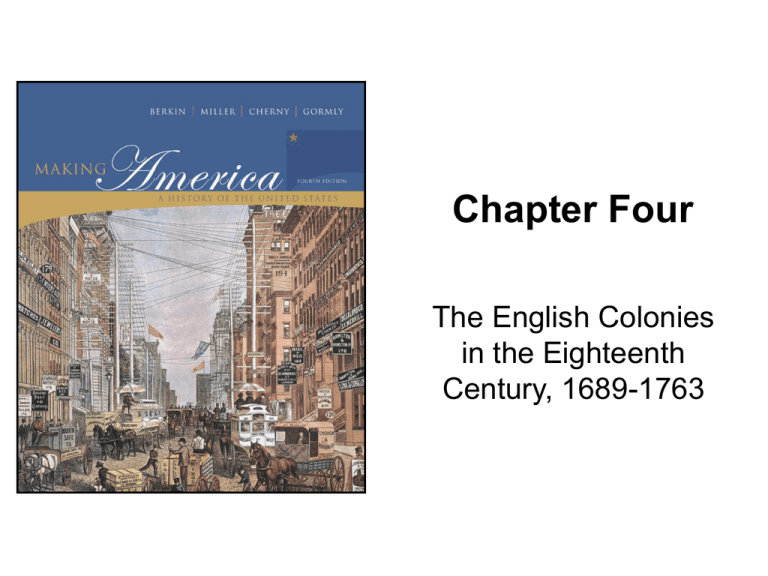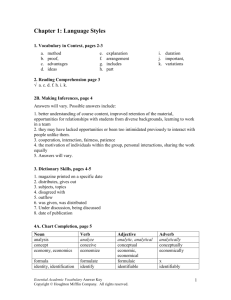
Chapter Four
The English Colonies
in the Eighteenth
Century, 1689-1763
Berkin, Making America
Chapter 4
The economies of most of the
English colonies revolved around
1. fisheries.
2. manufacturing.
3. agriculture.
4. mining.
Copyright © Houghton Mifflin Company. All rights reserved.
4-2
Berkin, Making America
Chapter 4
The economies of most of the
English colonies revolved around
3. agriculture.
Hint: South Carolina and Georgia produced rice and
indigo, the Chesapeake colonies grew tobacco,
and the middle colonies produced wheat. See
pages 89–92.
Copyright © Houghton Mifflin Company. All rights reserved.
4-3
Berkin, Making America
Chapter 4
Backcountry regions throughout
colonial North America
1. produced large crops for export to England.
2. traded extensively with New France.
3. had a low-level, subsistence economy.
4. produced precious metals in competition with the
gold and silver mines of Spanish America.
Copyright © Houghton Mifflin Company. All rights reserved.
4-4
Berkin, Making America
Chapter 4
Backcountry regions throughout
colonial North America
3. had a low-level, subsistence economy.
Hint: From north to south, the frontier region
produced just enough for survival. See page 90.
Copyright © Houghton Mifflin Company. All rights reserved.
4-5
Berkin, Making America
Chapter 4
In New England during the
eighteenth century,
1. scarce land impelled many to move farther west
or to commercial centers in the region.
2. slavery increased dramatically in importance.
3. farming declined in favor of the logging industry.
4. a surge of new immigration depressed labor
costs.
Copyright © Houghton Mifflin Company. All rights reserved.
4-6
Berkin, Making America
Chapter 4
In New England during the
eighteenth century,
1. scarce land impelled many to move farther west
or to commercial centers in the region.
Hint: See pages 92–93.
Copyright © Houghton Mifflin Company. All rights reserved.
4-7
Berkin, Making America
Chapter 4
Slavery increased in the South after
1680 because
1. fear of slave rebellions dramatically declined.
2. the supply of indentured servants fell off.
3. French slave companies aggressively marketed
more Africans.
4. Virginia shifted from subsistence agriculture to
tobacco growing.
Copyright © Houghton Mifflin Company. All rights reserved.
4-8
Berkin, Making America
Chapter 4
Slavery increased in the South after
1680 because
2. the supply of indentured servants fell off.
Hint: See pages 94–97.
Copyright © Houghton Mifflin Company. All rights reserved.
4-9
Berkin, Making America
Chapter 4
Few cities developed in the
Chesapeake region because
1. it was a depressed, poverty-stricken area.
2. legislation there imposed high taxes on urban
development.
3. it was too cold.
4. merchants did not settle there.
Copyright © Houghton Mifflin Company. All rights reserved.
4-10
Berkin, Making America
Chapter 4
Few cities developed in the
Chesapeake region because
4. merchants did not settle there.
Hint: See pages 98–99.
Copyright © Houghton Mifflin Company. All rights reserved.
4-11
Berkin, Making America
Chapter 4
It was easier for slaves in the Lower
South to develop their own culture
than those in the Chesapeake
because
1. their owners encouraged it.
2. they were concentrated in large numbers on
plantations.
3. they were healthier.
4. All of these
Copyright © Houghton Mifflin Company. All rights reserved.
4-12
Berkin, Making America
Chapter 4
It was easier for slaves in the Lower
South to develop their own culture
than those in the Chesapeake
because
2. they were concentrated in large numbers on
plantations.
Hint: Living in very small isolated groups, they were
too few in number to form a distinctive culture.
See page 96.
Copyright © Houghton Mifflin Company. All rights reserved.
4-13
Berkin, Making America
Chapter 4
The Stono Rebellion in 1739
1. was a revolt by indentured servants.
2. pitted a planter aristocracy against backcountry
farmers.
3. never actually happened and is just myth.
4. convinced southern whites that the possibility of
slave uprisings existed.
Copyright © Houghton Mifflin Company. All rights reserved.
4-14
Berkin, Making America
Chapter 4
The Stono Rebellion in 1739
4. convinced southern whites that the possibility of
slave uprisings existed.
Hint: This uprising resulted in actual deaths among
white settlers. See pages 99–100.
Copyright © Houghton Mifflin Company. All rights reserved.
4-15
Berkin, Making America
Chapter 4
The Middle Colonies were wellknown for
1. the lack of conflict with the backcountry.
2. disinterest in the theories of John Locke.
3. escaping harm in the French and Indian War.
4. the dynamic urban life of New York City and
Philadelphia.
Copyright © Houghton Mifflin Company. All rights reserved.
4-16
Berkin, Making America
Chapter 4
The Middle Colonies were wellknown for
4. the dynamic urban life of New York City and
Philadelphia.
Hint: See pages 95–98.
Copyright © Houghton Mifflin Company. All rights reserved.
4-17
Berkin, Making America
Chapter 4
According to social contract theory,
1. business contracts can always be altered if both
parties agree.
2. people have a right to rebel if the government
violates their natural rights.
3. a monarch has a “contract” with God to rule on
earth.
4. government should provide social services for a
community's citizens.
Copyright © Houghton Mifflin Company. All rights reserved.
4-18
Berkin, Making America
Chapter 4
According to social contract theory,
2. people have a right to rebel if the government
violates their natural rights.
Hint: Social contract theory justified revolution. See
page 102.
Copyright © Houghton Mifflin Company. All rights reserved.
4-19
Berkin, Making America
Chapter 4
“A wonderful power was in the room and
with one accord they began to cry out
and weep most bitterly for the space of
half an hour. Some of the people were . .
. crying to God for mercy.” This quotation
is a description of a Great Awakening
sermon preached by a(n)
1. Old Side Congregationalist.
2. Old Side Presbyterian.
3. Methodist.
4. deist.
Copyright © Houghton Mifflin Company. All rights reserved.
4-20
Berkin, Making America
Chapter 4
“A wonderful power was in the room and
with one accord they began to cry out and
weep most bitterly for the space of half an
hour. Some of the people were . . . crying
to God for mercy.” This quotation is a
description of a Great Awakening sermon
preached by a(n)
3. Methodist.
Hint: The quotation describes the passion associated with the
Great Awakening, and George Whitefield was one of the
leading preachers of that movement. See pages 102–104.
Copyright © Houghton Mifflin Company. All rights reserved.
4-21

